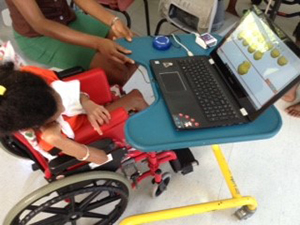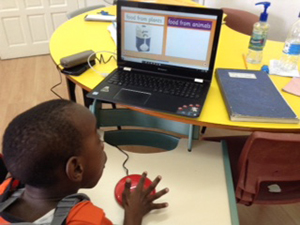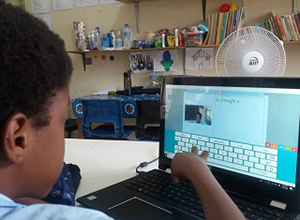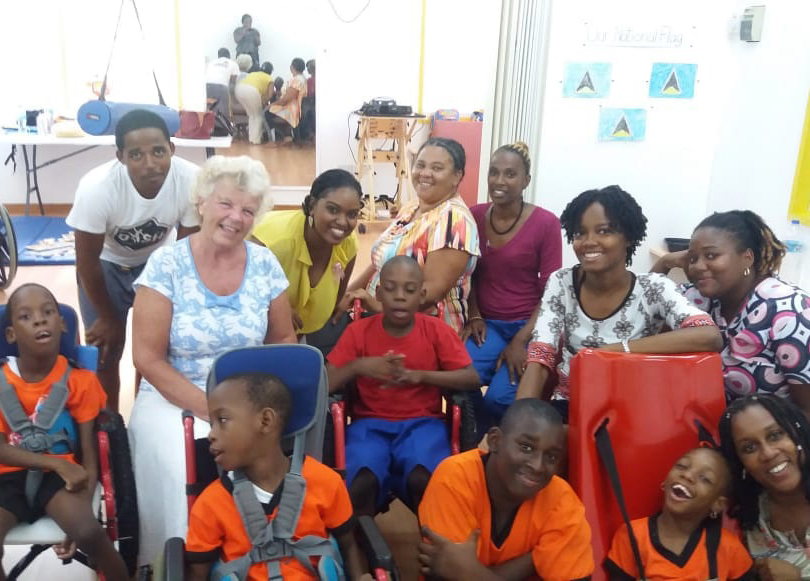Dunnottar School and Vocational Centre is a school heavily dependent on charitable donations, situated in Castries, the capital city of St. Lucia in the Windward Islands of the Caribbean. It caters to 102 students within the ages of 5 to 25 with a range of physical and learning disabilities including cerebral palsy, Down syndrome, and autism, and is spread over 15 classrooms.
Currently the school is split over two sites, as the main building at the original site was declared unfit and beyond repair 3 years ago, so it is now housed in a rented school across the city. Not an ideal situation, but the staff, students, and parents do their best to continue to work as best they can. On St. Lucia, there are no speech therapists, nor occupational therapists, and physical therapy is only available up to kindergarten age, so the 25 teachers and six aides have many roles to play.
I am a retired teacher with well over 35 years experience in many areas within education: in the mainstream elementary classroom, in the Education Board as a technology advisor and teacher trainer (where I gained my Clicker experience), and in special education as a classroom teacher and trainer.

I have been supporting this school for over six years now, volunteering for a month at a time at the school, introducing a multi-sensory curriculum approach to teaching and learning, as well as fundraising in my home area. Over the years I have raised over £10,000 ($13,000 USD) from my village area...not bad for a one shop, one pub village!
The unit I was working with this year (Dunnottar Multi Disabled Centre, DMDC) is a relatively new unit for Dunnottar, and ever since I visited it two years ago, I just knew that Clicker was needed for the students there. The children mostly have cerebral palsy, are non-verbal, but most have good cognitive abilities. The teachers were at a loss with trying to teach them educational subjects as they felt there were very few ways to assess if any learning was taking place.
This is something I excelled in during my own career, teaching similarly disabled children to communicate, read, spell, count, etc. Investing in a 5 Computers OneSchool Licence for Clicker was an ideal way to get things started.

We initially installed Clicker on two classroom laptops. I wanted to work with the children to gain the teachers’ interest and give them something they could use immediately. At the time, the teachers were assessing the children's learning, engaged in an exercise in classification of foods from plants or animals, using pictures and pointing. I set up a Clicker Set with the same exercise very quickly, then using switch access, had a child working independently on a similar exercise after just two minutes, high-fiving me each time he succeeded, and having his self-esteem go through the roof! This immediately sparked the teachers’ curiosity and they were hooked! I primarily wanted to get the students used to using the switches at this point, but also wanted the staff to realize the potential of the software in conjunction with the switches.

Within the same unit, there are children who do have voices, but have never had therapy to correct their speech, so the recording element of Clicker really helped. Setting up an initial sound activity with speech/recording had one child working very hard to pronounce his "a" sounds correctly, wanting to re-record his voice to show his improvement, again using switch access and acting independently. Others just responded so well to the positive reinforcement they received on completing a task.
Talking books were a huge hit with all. The parents and students had created simple story books of their summer vacations, along with photographs. I created a talking book for each student, then using a projector and the switch access, we invited other staff to come along and watch and listen to their students tell their own stories. It was a huge success, and new ideas for using the talking books facility just flowed from the staff.

Word spread throughout the school about this software, and soon, all the other teachers were asking for a demonstration, which resulted in a hectic timetable of training for all!
Within a day of their training, teachers were telling me of activities they had tried with their students and the fantastic success they were having along with the interest being shown by the students. They could see student self-esteem rising with each push of a button. All the staff members are extremely excited, and they have set up a timetable for the laptops on which Clicker is installed to ensure that as many children as possible are given an opportunity to access the software.
I have discovered that the use of Clicker is a first for not only St. Lucia, but apparently for the whole of the Caribbean....quite a feather in the cap for a lowly charitable trust school. Switch access has never been used either...another first!
Clicker has changed the way these children will learn and the way the teachers will teach. The whole school is very excited at the prospect of using the software more widely in the future. I am receiving messages daily from staff with photographs of the students using Clicker and switch access for those who need it. On behalf of all of them…Thank you, Crick Software!
